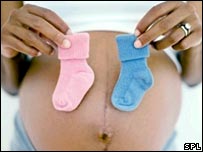
Sex selection was discussed before people were asked their views
|
Parents should not be allowed to choose their baby's sex simply to balance their family, a snapshot survey finds.
The Newcastle University study showed that 80% of people questioned felt social sex selection was wrong.
They feared children could be turned into "consumer items", and that sex selection could lead to choosing babies on the basis of eye or hair colour.
The survey follows a recent Commons Science and Technology Committee report which advocated allowing gender choice.
However, the committee did not unanimously back the report.
Gift
Researchers from the Policy Ethics and Life Sciences Unit at Newcastle University interviewed 48 male and female members of the public and 10 medics.
They were asked their opinions after a discussion about the pros and cons of selecting the sex of a baby.
 |
 I was surprised by the results, but these were not off the cuff remarks these were the results of considered views after an hour or two of discussion I was surprised by the results, but these were not off the cuff remarks these were the results of considered views after an hour or two of discussion 
|
There were concerns that allowing a choice of sex could send out the message that it is morally acceptable to have a strong preference for one sex over the other.
Others suggested that offering choices like this might place an unfair burden on ordinary people.
'Considered views'
Dr Tom Shakespeare, author of the study, which was funded by the Welcome Trust, said there had been some surprise that those questioned were so vehemently against sex selection.
"A lot of people say there is nothing wrong with sex selection, but the lay people we spoke to thought that it would change something important.
"I was surprised by the results, but these were not off-the-cuff remarks.
"These were the results of considered views after an hour or two of discussion.
"With a lot of subjects we have found that people change their minds, but not on this."
He added: "Our participants were very markedly against pre-natal sex selection (PSS).
"There was a greater ambivalence about using pre-implantation genetic diagnosis (PGD) to select against genetic defect.
The 'family balancing' argument - where couples choose to have a child of one sex when they already have children of the other - had little support.
'Thin end of the wedge'
And there were fears sex selection could be the thin end of the wedge.
One said: "Where does it actually stop? Do you stop at boys, girls, blonde hair, blue eyes. superior race where does it stop?"
Josephine Quintavalle, speaking on behalf of Comment on Reproductive Ethics (CORE), said she was delighted by the finding, which she called 'a victory for common sense."
"The public know where limits should be and it gladdens my heart."
She added that she felt the minority were the driving force behind allowing sex selection.
And a spokesman for the Human Fertilisation and Embryology Association (HFEA) reinforced their own research that the public were not in favour of sex selection for social reasons.
But Dr Evan Harris, a Liberal Democrat member of the Science and Technology committee, who backed the committee's report, said he felt opinion polls should not be allowed to affect any policy making for others unless it could be shown that the decisions being taken might cause harm.
"The point about reproductive autonomy is not whether people think it is a good idea, but whether people themselves think it is such a bad idea that it would do harm."
|


 字體:小 中 大
字體:小 中 大














